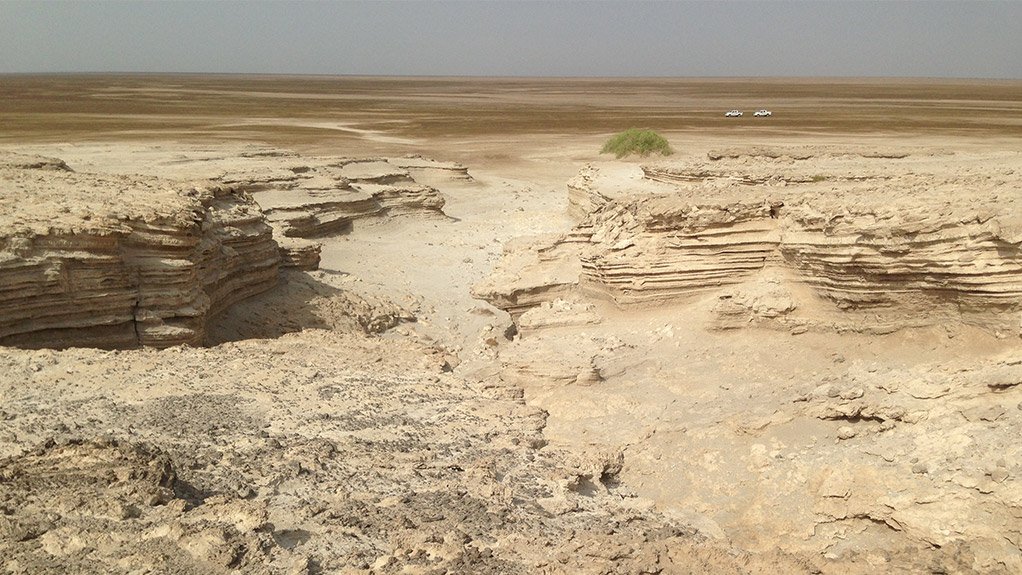South Boulder publishes PFS for Eritrea potash project
PERTH (miningweekly.com) – The prefeasibility study (PFS) into the Colluli potash project, in Eritrea, has estimated that the project would require an initial investment of some $442-million. The PFS examined a two-module development with an expected production of 425 000 t/y

PERTH (miningweekly.com) – The prefeasibility study (PFS) into the Colluli potash project, in Eritrea, has estimated that the project would require an initial investment of some $442-million.
The PFS examined a two-module development with an expected production of 425 000 t/y sulphate potash for the first five years of operation, increasing to 850 000 t/y for the remainder of the proposed 30-year mine life.
ASX-listed South Boulder Mines said on Wednesday that the Phase 1 development would include a project-owned and -built road, as well as a 900 000 t/y product export terminal.
Phase 2 of the project development would require a further capital investment of some $282-million, but would in part be funded through project cash flows.
During Phase 1 operations, the Colluli project was expected to have a net present value of $462-million and an internal rate of return of 22.3%, which would increase to $845-million and 24.7% respectively at the start of Phase 2operations.
“We are extremely pleased with the highly favourable outcomes of the PFS for the development of the Colluli potash project,” said South Boulder MD Paul Donaldson.
The PFS was based on a 1.28-billion-tonne resource, containing some 152.7-million tonnes of potassium oxide.
Openpit mining would be conducted using conventional truck and shovel methods to access the ore, and average total cash cost for Phase 1 has been estimated at $210/t, dropping to $189/t during Phase 2.
First production was slated to start in 2018.
South Boulder and its joint venture partner Eritrean National Mining Companyhad taken the decision to move the project to the definitive feasibility study (DFS) stage by the third quarter of this year.
“We have already commenced optimisation testwork for the process plant and as we continue the DFS work, we will further advance conversations with strategic partners to assist with development of this globally significant project,” said Donaldson.
EDITED BY: MARIAAN WEBB

Genbhothabt March 5, 2015
Poor Eritreans your resources are looted by hgdf and raise money for its security. Wgat is your problem to voice your concern. Your brother is guarding the mining area for free by the name of national service. You big sister is celebrating hgdfs events and your mother has no light, water, abd basic things. When do you think you realise you and your families are treating inhuman? Sometimes when I think that I hate muy eritrean nationality.
HYPE AND CHANGE March 6, 2015
Genbhothabt
Our Eritrean peoples’ main problem is demiht /tpdm ,that is the only time our government was scared and had to come up with explanation, that the soldiers that were cheking ID from Eritreans were not foreign tegaru but amiches that did not know tigrinya well and had lived in teklehaymanot area in addis abeba.So ,you need to know what we ERitreans think out of line is, before yoiu make judgements..People did not demand explanation from their government ,why manjus was selling their kids to bedewin & rashaidas ,but were outraged by tegaru asking for IDs.Go figure.
shigey March 6, 2015
The systematic stripping of Eritrea’s mineral resources continues. It is not enough for the PFDJ regime to give foreign companies ownership of the Mining, which has benefited DIA and a handful of cohorts, but has yet to trickle down to the Eritrean population which continues to go without electricity and water supplies.
In the Eritrean Mining business there is no transparency or accountability and neither the Eritrean Ministry of Energy and Mines, nor the Commercial Bank of Eritrea are aware of the management of the Mining resources and revenue in Eritrea. They do not know what is going on and they are not allowed to ask.
Everything is dealt with from the president’s office, and so far the potash revenue from the Mining has been paid into the Bank of China, in China, and Gastom Bank in Russia. The revenue is paid in dollars. The Eritrean regime is also using two German Banks, DV Bank, and Commerz Bank, which are both in Frankfurt and used for illicit transactions and money transfer.
Natu March 6, 2015
Mining is the only economic sector that PFDJ can undertake a “secured” exploration in the “most safe and secured nation of the world” though we had other sectors like tourism and agricultural developements,…etc that can easily be enhenced and be made more effective. I ask my self, why the regime so in a hurry to loot the expensive natural resource so cheap (40% sahre !) we have inherited from mother nature and our ancestors just in this unsuitable phase of our country building time. This is also at the cost of our descendants too. No wonder that the western capital enterprise (Shareholders & co) are so silent while Eritreans are suffering !
Another sad thing is the untransparent businesses the regime is running since its birth. Eritresa is earning so much money (ex only from Nevsun resources about 3 Tonnes/Quartal ! ), but the country dark with not enough supply of electricity and water. Not only the natural resources in the earh are nationalized, but als the whole population – VERY SAD.
2015, the year of HOPE! Lets wait and see the election in Ethiopia in May 2015.
HYPE AND CHANGE March 6, 2015
Natu
you answered your own question excellently .pfdj has international links ,that is why to topple pfdj would be extremely difficult ,even if we had a decent opposition.